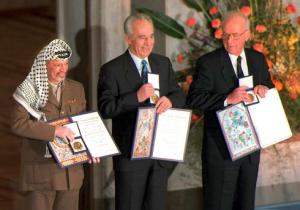Shimon Peres, 1923-2016Shimon Peres and the legacy of the Oslo Accords
Shimon Peres, the former prime minister of Israel, has died at the age of 93. A titan of Israeli political life, Peres remained an active player in his country and the region until his death, working hard to promote closer ties between Israelis and Palestinians. He will be remembered above all else for his role in negotiating the 1993 Oslo Peace Accords and for winning the Nobel Peace Prize in 1994 along with then-Israeli Prime Minster Yitzak Rabin and Yasser Arafat. The Oslo Accord delayed dealing with the core issues of the Israeli-Palestinian conflict — the status of Jerusalem, right of return for the 1948 Palestinian refugees, the status of the Jewish settlements in the West Bank and Gaza, the borders of the Palestinian territory – for a later date, but that date has yet to arrive. Although the two sides are far apart, Peres died an optimist, still hopeful that the day would come when the Israeli Defense Forces’ soldiers would serve purely for peace. As he famously put it: “Impossibility is only a product of our prejudice.”

Arafat, Peres and Rabin collect their shared Nobel Prize // Source: theconversation.com
Shimon Peres, the former prime minister of Israel, has died at the age of 93 after suffering a stroke. A titan of Israeli political life, Peres remained an active player in his country and the region until his death, working hard to promote closer ties between Israelis and Palestinians.
He will be remembered above all else for his role in negotiating the 1993 Oslo Peace Accords and for winning the Nobel Peace Prize in 1994 along with then-Israeli Prime Minster Yitzak Rabin and Yasser Arafat, who was at the time chairman of the Palestinian Liberation Organization (PLO). A peace treaty with Jordan also followed, which established mutual recognition between that country and Israel.
Peres always believed that the Israelis needed to be a proactive partner in the peace process. As he put it in 2013: “We can and should bring an end to the conflict – and we have to be the initiators. Playing hard-to-get may be a romantic proposition, but it’s not a good political plan.”
His dedication to the peace process was established even before Oslo. In the late 1980s, Peres was involved in a secret agreement with Jordan’s King Hussein. Signed in April 1987, the so-called London Agreement outlined a framework for a solution to the Arab-Israeli conflict that would focus on education and the development of the two countries’ respective economies. Unfortunately the Israeli prime minister at the time, Yitzak Shamir, disagreed, and refused to approve the agreement.
Peres was involved in the peace process again by the early 1990s, while serving as foreign minister under Rabin. But before Oslo even took place there were internal battles about who to negotiate with – the PLO in Israel-Palestine, which was supposedly composed of moderates, or the PLO based in Tunis and led by Arafat. Ultimately, it was Arafat who came to the negotiating table.
To make this happen, both Peres and Rabin had to change their mind about dealing with the PLO abroad. Peres felt that it was futile to keep Arafat in exile in Tunisia since it made co-operation between the two sides more difficult.
Though the secret accords have been highly controversial ever since they were struck, they nevertheless included several noteworthy steps. The first was mutual recognition: for the first time, the PLO would recognize the state of Israel, and vice versa.
